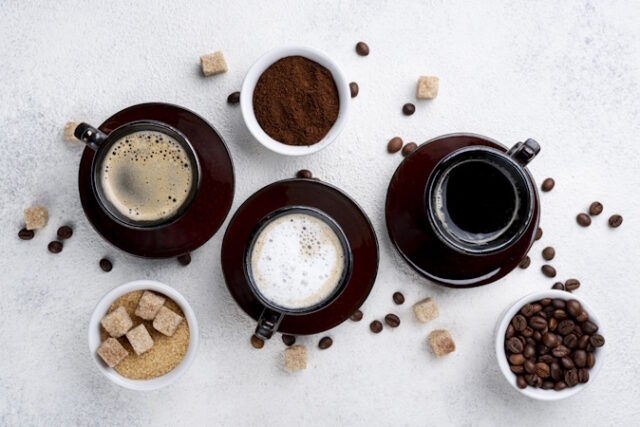
Coffee is a natural source of caffeine, a bitter-tasting stimulant that’s found naturally in more than 60 types of plants, and synthetically in energy drinks, sodas, and some types of medications.
A growing body of research suggests strong associations between caffeine consumption, skin health, and the biological process of aging.
Health spoke to skin and food experts and combed through the research to see what science actually says about caffeine’s impact on aging, both inside and out.
Caffeine and Skin Health
Research shows that caffeine can affect the health of your skin in a number of ways, both positive and negative. Read more below on how caffeine affects skin health.
Collagen Production
Collagen is an important building block of skin that provides structure and elasticity, giving it a more youthful, firm appearance. As you age, collagen levels naturally decrease, but research shows that coffee extract may help boost skin’s collagen levels.23 However, other studies show mixed results when it comes to caffeine and collagen.
“Some lab studies suggest caffeine may influence collagen synthesis and breakdown, but findings are mixed, and most are pre-clinical (not in humans),” Debbie Petitpain, MBA, RDN, a spokesperson for the Academy of Nutrition and Dietetics, told Health.
Dehydration and Skin Elasticity
The key is to consume it in moderation. “High levels of caffeine can dehydrate you and therefore dehydrate your skin from the inside out,” Anthony M. Rossi, MD, FAAD, FACMS, founder of Dr. Rossi Derm MD Skincare, told Health.45
However, one study found that coffee pulp extract significantly improved skin elasticity, moisture, brightness, texture, and other positive skin health indicators associated with younger-looking skin
Other research has also shown beneficial effects of coffee extract on skin elasticity and moisture, which have been associated with the levels of polyphenols (plant compounds with antioxidant properties) found in coffee.
Inflammation
Low to moderate amounts of caffeine can be particularly beneficial in fighting inflammation.
“A little bit of caffeine is OK, particularly if it comes from coffee or tea (regular or decaf) because these beverages contain antioxidants and polyphenols that may help reduce inflammation and protect skin from oxidative stress, which contributes to aging,” said Petitpain.
What the Science Says About Caffeine and Biological Aging
Researchers note that moderate consumption of caffeine is linked to substantial benefits in reducing biological aging.
Scientists have discovered that caffeine can boost DNA repair and stress response in your cells, which may potentially slow down the aging process. However, further studies in humans are needed to confirm this effect.
Is Coffee Actually Good For You?
Coffee is good for your health, but only when consumed in moderation. Too much caffeine is bad for your skin and your health.
Excessive caffeine intake can lead to increased heart rate, anxiety, sleep problems, digestive problems, and high blood pressure.
Keep your intake at a healthy level by consuming no more than 400 milligrams of caffeine per day, which is about two to three 12-ounce cups of coffee.
The Bottom Line
Caffeine is good for you in low to moderate doses. The research shows that moderate caffeine consumption can help slow down biological aging and reduce the risk of chronic diseases such as heart disease and type 2 diabetes.
However, too much can wreak havoc on your skin and may lead to visible signs of aging.
Frequently Asked Questions
Does caffeine cause wrinkles?
While caffeine doesn’t directly cause wrinkles (factors such as the gradual breakdown of collagen and sun exposure do), excess amounts of caffeine can lead to dehydration, which can make skin drier and cause wrinkles and fine lines to appear more visible and pronounced.
Does decaf have the same positive effects on skin health as caffeine?
While caffeine doesn’t directly cause wrinkles (factors such as the gradual breakdown of collagen and sun exposure do), excess amounts of caffeine can lead to dehydration, which can make skin drier and cause wrinkles and fine lines to appear more visible and pronounced.
Can quitting coffee reverse aging?
There’s no need to quit coffee if you want to feel and look young. Biological aging is caused by a number of factors, from genetics to diet to lifestyle, so quitting coffee won’t turn back the clock on its own.
In fact, moderate consumption of coffee is beneficial for skin health and may have significant effects on biological aging
Disclaimer
Artificial Intelligence Disclosure & Legal Disclaimer
AI Content Policy.
To provide our readers with timely and comprehensive coverage, South Florida Reporter uses artificial intelligence (AI) to assist in producing certain articles and visual content.
Articles: AI may be used to assist in research, structural drafting, or data analysis. All AI-assisted text is reviewed and edited by our team to ensure accuracy and adherence to our editorial standards.
Images: Any imagery generated or significantly altered by AI is clearly marked with a disclaimer or watermark to distinguish it from traditional photography or editorial illustrations.
General Disclaimer
The information contained in South Florida Reporter is for general information purposes only.
South Florida Reporter assumes no responsibility for errors or omissions in the contents of the Service. In no event shall South Florida Reporter be liable for any special, direct, indirect, consequential, or incidental damages or any damages whatsoever, whether in an action of contract, negligence or other tort, arising out of or in connection with the use of the Service or the contents of the Service.
The Company reserves the right to make additions, deletions, or modifications to the contents of the Service at any time without prior notice. The Company does not warrant that the Service is free of viruses or other harmful components.












